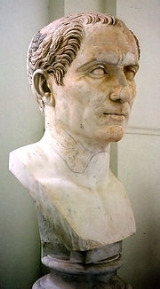
and a distinguished writer of Latin
prose. He played a critical role in the gradual transformation of the Roman Republic
into the Roman Empire
.
In 60 BC, Caesar, Crassus
and Pompey
formed a political alliance
that was to dominate Roman politics for several years. Their attempts to amass power through populist
tactics were opposed by the conservative elite
within the Roman Senate
, among them Cato the Younger
with the frequent support of Cicero
.
52 BC Vercingetorix, leader of the Gauls, surrenders to the Romans under Julius Caesar, ending the siege and Battle of Alesia.
49 BC Julius Caesar crosses the Rubicon, signaling the start of civil war.
49 BC Julius Caesar's general Gaius Scribonius Curio is defeated in the Second Battle of the Bagradas River by the Numidians under Publius Attius Varus and King Juba of Numidia. Curio commits suicide to avoid capture.
48 BC Battle of Dyrrhachium: Julius Caesar barely avoids a catastrophic defeat to Pompey in Macedonia.
46 BC Julius Caesar defeats Titus Labienus in the Battle of Ruspina.
46 BC Julius Caesar defeats Caecilius Metellus Scipio and Marcus Porcius Cato (Cato the Younger) in the battle of Thapsus.
46 BC Julius Caesar dedicates a temple to his mythical ancestor Venus Genetrix in accordance with a vow he made at the battle of Pharsalus.
45 BC In his last victory, Julius Caesar defeats the Pompeian forces of Titus Labienus and Pompey the Younger in the Battle of Munda.
44 BC Julius Caesar, Dictator of the Roman Republic, is stabbed to death by Marcus Junius Brutus, Gaius Cassius Longinus, Decimus Junius Brutus and several other Roman senators on the Ides of March.
43 BC Battle of Forum Gallorum: Mark Antony, besieging Julius Caesar's assassin Decimus Junius Brutus Albinus in Mutina, defeats the forces of the consul Pansa, who is wounded.
Horum omnium fortissimi sunt Belgae.![]()
Fere libenter homines id quod volunt credunt.![]()
Galia est pacata.![]()
Sed fortuna, quae plurimum potest cum in reliquis rebus tum praecipue in bello, parvis momentis magnas rerum commutationes efficit; ut tum accidit.![]()
Nihil nobis metuendum est, praeter metum ipsum.![]()

